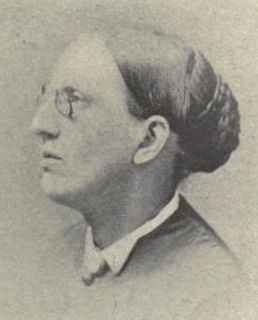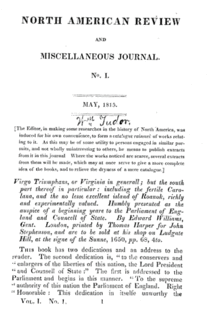
Edward Everett was an American politician, pastor, educator, diplomat, and orator from Massachusetts. Everett, as a Whig, served as U.S. Representative, U.S. Senator, the 15th Governor of Massachusetts, Minister to Great Britain, and United States Secretary of State. He also taught at Harvard University and served as its president.

The American Academy of Arts and Sciences is one of the oldest learned societies in the United States. It was founded in 1780 during the American Revolution by John Adams, John Hancock, James Bowdoin, Andrew Oliver, and other Founding Fathers of the United States. It is headquartered in Cambridge, Massachusetts.

The Boston Brahmins or Boston elite are members of Boston's traditional upper class. They are often associated with Harvard University; Anglicanism; upper-class clubs such as the Somerset in Boston, the Knickerbocker in New York City, the Metropolitan in Washington, D.C., and the Pacific-Union Club in San Francisco; and traditional Anglo-American customs and clothing. Descendants of the earliest English colonists are typically considered to be the most representative of the Boston Brahmins. They are considered White Anglo-Saxon Protestants.

Edward Everett Hale was an American author, historian, and Unitarian minister, best known for his writings such as "The Man Without a Country", published in Atlantic Monthly, in support of the Union during the Civil War. He was the grand-nephew of Nathan Hale, the American spy during the Revolutionary War.

Jared Sparks was an American historian, educator, and Unitarian minister. He served as President of Harvard College from 1849 to 1853.
The Society for the Diffusion of Useful Knowledge (SDUK) was founded in London in 1826, mainly at the instigation of Whig MP Henry Brougham, with the object of publishing information to people who were unable to obtain formal teaching or who preferred self-education. It was a largely Whig organisation, and published inexpensive texts intended to adapt scientific and similarly high-minded material for the rapidly-expanding reading public over twenty years until it was disbanded in 1846.

John Lowell Jr. was an American businessman, early philanthropist, and through his will, founder of the Lowell Institute.

Josiah Holbrook was the initiator and organizer of the lyceum movement in the United States. He formed the first industrial school in the country in 1819, organized the first lyceum school in the country in 1826 and inspired the foundation of the American Lyceum Association, the first national education association. He founded the Holbrook School Apparatus Manufacturing Company and made a variety of teacher aid items for common schools and scientific training aids for teachers to use in lyceums. He also wrote and traveled extensively to promote the lyceum concept. His method combined teaching in academic subjects like Greek, history and mathematics with practical farming skills and crafts. In the beginning, his system flourished in the New England states, later branching out into the Midwestern states, and eventually going nationwide to 3,000 towns and cities. He was also an advocate of professional teacher training and broadening female education.

The Penny Cyclopædia published by the Society for the Diffusion of Useful Knowledge was a multi-volume encyclopedia edited by George Long and published by Charles Knight alongside the Penny Magazine. Twenty-seven volumes and three supplements were published from 1833 to 1843.

The Union Club of Boston, founded in 1863, is one of the oldest gentlemen's clubs in the United States. It is located on Beacon Hill, adjacent to the Massachusetts State House. The clubhouse at No. 7 and No. 8 Park Street was originally the homes of John Amory Lowell (#7), and Abbott Lawrence (#8). The houses were built c.1830-40, and they were remodeled for club use in 1896. The clubhouse overlooks the Boston Common, and has views of the Common itself, Boston's Back Bay neighborhood, and the hills to the west of the city.
The Howison Lectures in Philosophy are a lecture series established in 1919 by friends and former students of George Howison, who served as the Mills Professor of Intellectual and Moral Philosophy and Civil Polity at the University of California, Berkeley.
Professor Howison held the reasoned conviction that this world to its very depth is kindred to the human spirit; that it is a community of free persons, finite and infinite, sustained by the vision of the Perfect; and all his great powers were directed to awaken in others a loyalty to these ideas. And those, it would seem, would most speak from a foundation in his memory who were able to share with him this high purpose and conviction.
The Mercantile Library Association (1820-1952) of Boston was an organization dedicated to operating a subscription library, reading room and lecture series. Members included James T. Fields and Edwin Percy Whipple. Although the association had a relatively long history, its heyday occurred in the mid-19th century, particularly the 1840s and 1850s.
Amory Hall was located on the corner of Washington Street and West Street in Boston, Massachusetts, in the 19th century. Myriad activities took place in the rental hall, including sermons; lectures by Henry David Thoreau, Ralph Waldo Emerson, William Lloyd Garrison; political meetings; exhibitions by Rembrandt Peale, George Catlin, John Banvard; moving panoramas; magic shows; concerts; and curiosities such as the "Nova Scotia Giant Boy."

Caroline Wells Healey Dall was an American feminist writer, transcendentalist, and reformer. She was affiliated with the National Women's Rights Convention, the New England Women's Club, and the American Social Science Association. Her associates included Elizabeth Peabody and Margaret Fuller, as well as members of the Transcendentalist movement in Boston.
The Mechanic Apprentices Library Association (1820-1892) of Boston, Massachusetts, functioned as "a club of young apprentices to mechanics and manufacturers ... whose object is moral, social, and literary improvement." Some historians describe it as "the first of the kind known to have been established in any country." Founded by William Wood in 1820, it also had an intermittent formal relationship with the larger, more established Massachusetts Charitable Mechanic Association. In its heyday, roughly 1820s-1850s, the Apprentices Library "[met] quarterly ; ... [had] nearly 200 members, and a library of about 2000 volumes; connected with which [was] a reading room, gratuitously supplied with the best newspapers and magazines of the city, and a cabinet of natural history. In addition to these advantages, the association [had] lectures and debates in the winter, and a social class for the study of elocution in the summer."

North American Review (NAR) was the first literary magazine in the United States. It was founded in Boston in 1815 by journalist Nathan Hale and others. It was published continuously until 1940, after which it was inactive until revived at Cornell College in Iowa under Robert Dana in 1964. Since 1968, the University of Northern Iowa in Cedar Falls has been home to the publication. Nineteenth-century archives are freely available via Cornell University's Making of America.
The Boston Lyceum (est.1829) of Boston, Massachusetts was a civic association dedicated to popular education in the form of "lectures, discussions, ... declamation," and writing contests. It began "in Chauncy Hall on 25 June 1829. On 13 August 1829 it formed its classes and made provisions for lectures and debates." Annual members' "exhibitions" of elocution took place in various venues around town, such as the Masonic Temple (1832), Tremont Hall (1839) and the Odeon (1840). Leaders included George Bancroft, Timothy Claxton, James T. Fields, Abbott Lawrence, William H. Prescott, William D. Ticknor, and Amasa Walker. Among the many lecturers: Nehemiah Adams, J.A. Bolles, David Paul Brown, Rufus Choate, William M. Cornell, C.C. Emerson, James Pollard Espy, Edward Everett, Dr. Grigg, George S. Hillard, Oliver Wendell Holmes, Dr. C.T. Jackson, N. Jones, Rev. John Pierpont, Edgar Allan Poe, John Osborne Sargent, William H. Simmons, Charles Sumner, B.B. Thatcher, Henry Theodore Tuckerman, Amasa Walker, and E.M.P. Wells.

The Library of Entertaining Knowledge was founded by the Society for the Diffusion of Useful Knowledge. The books appeared from 1829 to 1838, published in London by Charles Knight, and complemented the Society's Library of Useful Knowledge, which had not sold as well as hoped. The volumes were priced at 4s. 6d, more expensive than rival non-fiction series.

The March of Intellect, or the 'March of mind', was the subject of heated debate in early nineteenth-century England, one side welcoming the progress of society towards greater, and more widespread, knowledge and understanding, the other deprecating the modern mania for progress and for new-fangled ideas.
The American School Library was a set of books published by Harper & Brothers in 1838 and 1839 on behalf of the American Society for the Diffusion of Useful Knowledge. The Society was incorporated in the State of New York on May 16, 1837 at the urging of the Reverend Gorham D. Abbott. The American Society, and its Library, were inspired by "A Library of Useful Knowledge", a set of educational pamphlets published in England in the late 1820s by the UK's Society for the Diffusion of Useful Knowledge. The fifty books in the set included volumes on American, Egyptian and Chinese history, biographies of George Washington and Napoleon Bonaparte, the principles of physiology and health, and the novel The Swiss Family Robinson. The set of 50 books was priced twenty dollars, with the cost of providing a set to the nation's fifty thousand school districts set at one million dollars.


















